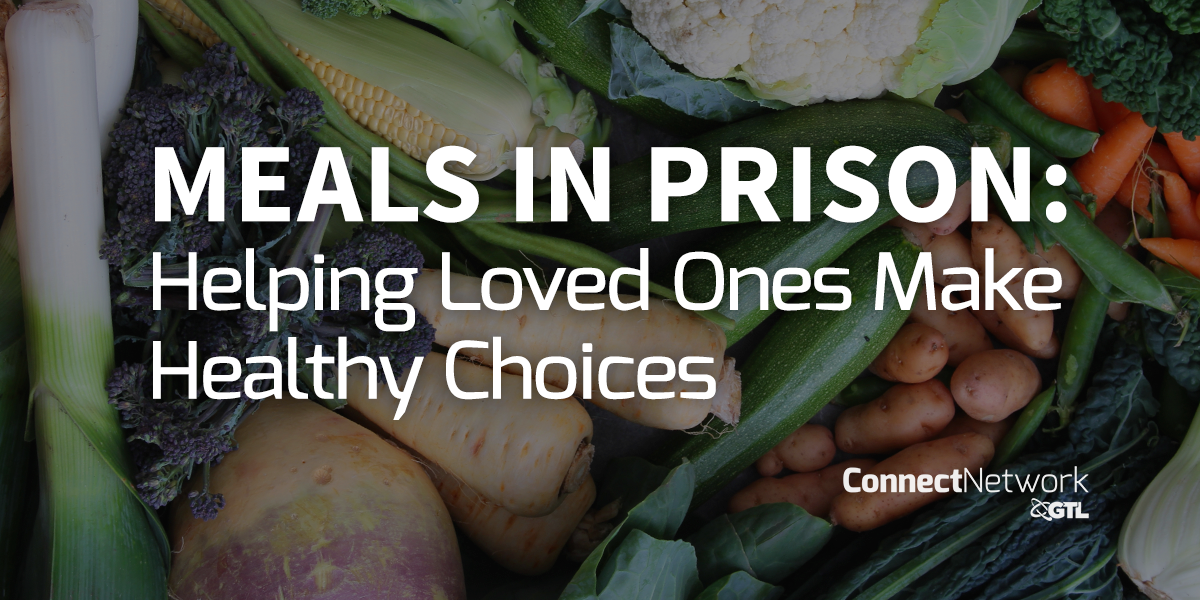Meals in Prison: Helping Loved Ones Make Healthy Choices
juin 21, 2016
Good nutrition has long been proven to provide physical benefits, but the mental and emotional benefits that stem from a healthy diet are equally important. While options vary by facility, inmates can choose nutritious meals in prison.
Inmates can also request healthy supplemental items when asking for care packages or ordering from the commissary.
According to the United States Department of Agriculture, including a variety of food groups and avoiding specific kinds of fats, sugars and additives is the key to staying healthy.
Making the right health-conscious meal choices can be accomplished with simple principles and small diet changes. Review our tips for choosing healthy eating alternatives.
Five Tips for Choosing Healthy Meals In Prison
Tip #1: Protein Is Powerful
High protein options can come in many forms.
Animal sources:
- Red meats
- Poultry
- Eggs
- Seafood
Plant sources:
- a variety of beans
- soy products
- nuts
Protein provides nutrients that are vital for an inmate’s health because they are packed with “building blocks” for bones, muscles, cartilage, skin, and blood.
Protein is a nutrient that helps other body processes like creating enzymes, regulating hormones, and supplying vitamins, which is crucial for maintenance of the body.
One of the three nutrients providing calories, is protein. It is important to be aware of the type of protein, because some protein sources can be high in saturated fats and cholesterol.
Lean protein is best, especially for red meats and poultry. Egg whites and most seafood options are excellent choices because they do not include high levels of fat or cholesterol.
Prefer a vegetarian diet? An inmate can still get a fill of protein by selecting only plant-based sources.
Tip #2: Fruits and Vegetables Are A Must
Surprisingly, the term “whole fruits” is not ONLY for fresh fruits.
We’ve all heard “focus on whole fruits”, and been discouraged when our only option is canned.
The good news is, “whole fruits” include:
- fresh,
- frozen,
- dried,
- and canned options.
Fruit in any form has the most benefit when it is unaltered.
What does this mean?
This means choosing options that are not processed or preserved with additives.
Fruit juice is very rarely 100% fruit, so be aware of the sugar and sodium levels of fruit juice.
The easiest way to determine if a fruit juice is a good choice is to make sure it has “No Added Sugar” on the label. Fruits are naturally high in sugar, so avoid juices and canned fruits that have added sugar.
Vegetables are equally valuable to a balanced diet. With less naturally occurring sugars than fruit, vegetables are especially important to include in daily meal choices.
A rule of thumb for selecting the best vegetable for overall health is to “go green”. A green vegetable packs more nutrients than other vegetables like a carrot or beet.
Select fruits and vegetables high in fiber to reduce the risk of:
- Heart disease
- Obesity
- Type 2 diabetes
Select fruits and vegetables high in potassium for:
- Lowering blood pressure
- Reduce risk of developing kidney stones
- Help decrease bone loss
Tip #3: Get the Recommended Whole Grains
Certain grains (specifically Whole Grains) are an important part of a balanced diet for many reasons.
Health.gov explains that “the recommended amount of grains in the Healthy U.S.-Style Eating Pattern at the 2,000-calorie level is 6 ounce-equivalents per day. At least half of this amount should be whole grains”.
People who eat whole grains as part of a healthy diet have a reduced risk of some chronic diseases, heart disease and constipation. Sticking to the recommended 6-ounces will help with weight management.
Consider simple changes like using whole grain bread over white bread or whole grain granola over sugary cereals.
If the healthier options are not readily available in an inmate’s facility, check with the facility to determine if they are allowed to be sent in care packages.
Tip #4: Smart Snacking
Snacking is almost always inevitable, and that’s all right because a healthy snack between meals in prison can actually help overeating, decrease your hunger and speed up metabolism.
Staying active is just as important as making healthy food choices. Snacking can be an important part of a diet when an inmate is active, because of the added energy boost.
It is important to avoid foods that are high in sugar, and snacks are no exception.
Even if sugar isn’t one of the first few ingredients, nutrition labels hide it by calling it names like “sucrose” or “glucose”. Added sugar between meals is counter-productive to a healthy diet so be wary of sweet snacks like cookies, candies and ice cream.
It is OK to have an unhealthy snack once in awhile. Never allowing any unhealthy snacks or sweets may result in sneaking these foods. The key is balance and moderation!
Finally, pay attention to the portion size of your snack. Oftentimes, the snack bags are labeled for two or three servings. Look for enough to satisfy a snack craving, which will be around 100 calories.
Tip #5: Understand Supplements
If it seems difficult to get all the necessary vitamins and nutrients needed while incarcerated, understanding the benefits of a supplement can help bridge the gap.
To best determine the type of vitamin or supplement to take (when allowed), analyze diet based on the food groups most eaten. Knowing which groups are lacking will help shed light on what nutrients could use a boost.
A generic “daily vitamin” is the easiest solution. However if it’s especially hard to get enough fish protein and an inmate has a bad heart, including a fish oil supplement will help.
It is important to check with the correctional facility before attempting to purchase vitamins and supplements, or include them in a care package. Only count on these dietary additions if they are approved for use while incarcerated.
Conclusion
With smart choices, added nutrition from care packages, and supplements it is possible to make healthy choices while eating meals in prison.
Remember these five tips, and use them while on the road to the best health possible:
- Protein is powerful
- Fruits and vegetables are a must
- Get the recommended whole grains
- Smart snacking
- Understand supplements
Posted In: Blog



